Tuesday 6 December 2016
Friday 11 November 2016
Transformative Adaptation
What defines Indigeneity?
For my purposes, the proper answer to this question comes from Protocol 169, International Labour Law (Convention No. 169, 2014). Identification of indigenous and tribal peoples. The Convention does not define who are indigenous and tribal peoples. It takes a practical approach and only provides criteria for describing the peoples it aims to protect. Self-identification is considered as a fundamental criterion for the identification of indigenous and tribal peoples, along with the criteria outlined below. Elements of indigenous peoples include: Traditional life styles; Culture and way of life different from the other segments of the national population, e.g. in their ways of making a living, language, customs, etc.; Own social organization and political institutions; and Living in historical continuity in a certain area, or before others "invaded" or came to the area (Convention No. 169., 2014)
If a person or a group identifies themself as Indigenous, then they are Indigenous; as per Convention No. 169. The dominant colonial imperial system is resilient. The RASTAFARI people are also very resilient as demonstrated by their survival against brutal odds. It is clear from my research and life experience, that ownership over property, specifically land, is a key tenant of the Babylonian system. There are similarities between the teachings of RASTAFARI, and the systems business and the military. Namely a "Holistic" approach to the inter-connectedness and oneness of everything. In RASTAFARI culture this is best expressed in the lyrics of a Robert Nesta Marley song entitled "ONE LOVE." The systems approach introduced me to the concept of leverage points. RASTAFARI must unite with other indigenous groups to create a circle of unity that will allow them to survive and thrive within, and without a "global imperial system."
Global Consequences
Today, corporate imperialism has replaced colonialism; what is one potential consequence of this? With the increasing global legalization of marijuana for medical and scientific purposes, it is possible that the government and other corporate interests in Jamaica and elsewhere have taken great interest in the land, knowledge and seed of the 'ganga' held by the RASTAFARI people. This cash-crop has been grown on the Pinnacle land since its' founding. As a traditionally agricultural nation, the foreign currency income from the legal sale of marijuana worldwide would be substantial. The following are words taken directly from the BBC World News and the World Bank (two arms of Babylon), in their discussion on the amendment to the Dangerous Drugs Act in Jamaica
Convention No. 169. (2014). International labour Organization. Retrieved from http://www.ilo.int/indigenous/Conventions/no169/lang--en/index.htm
Subscribe to:
Posts (Atom)




















